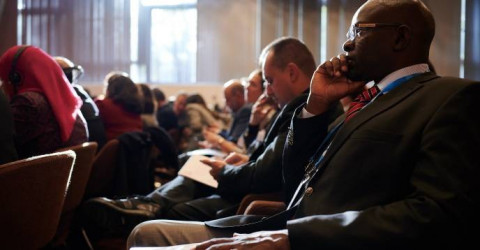
GCED Basic Search Form
Quick Search
You are here
News

For the first time in UNESCO’s history, ministers of education and university leaders came together to envisage international measures to improve inclusion and mobility in higher education.
“In the field of higher education, multilateralism and UNESCO in particular, have a key role to play,” said UNESCO Director-General Audrey Azoulay as she opened the meeting.
Over 100 ministers and 100 university representatives that are part of the UNESCO Chairs programme convened at UNESCO on 13 November during the Organization’s General Conference in Paris. They examined ways governments and higher education institutions can work together to meet the pressing challenge of creating a more inclusive global campus that can handle rapidly growing enrolment in higher education and increasing student mobility. They also envisaged ways for the world’s higher education sector to counter increasing inequalities and include marginalized groups.
“We need to take actions to enhance international cooperation in higher education, reinforce knowledge sharing, academic exchanges and mobility, and create a fair, transparent and inclusive global campus that offers quality, inclusive and lifelong learning opportunities for all,” argued Stefania Giannini, UNESCO Assistant Director-General for Education.
“One of the challenges we have in education is the democratization of the credentialing process,” said Tina Beaudry-Mellor, Minister of Advanced Education Saskatchewan, Council of Ministers of Education, Canada.
A rapidly changing landscape
The global higher education landscape is rapidly changing with increasing internationalization, diversification of providers, and new modes of learning. Some 220 million students are currently enrolled in higher education worldwide, twice as many as ten years ago and further growth is expected, especially in Africa.
However, increased enrolment is not a reliable indicator of progress in achieving the internationally agreed 2030 Agenda’s goal of ensuring that educational systems “leave no one behind” and providing equitable, affordable quality higher education. Institutions face the challenge of providing quality education to an increasingly diverse student population, including non-traditional learners and disadvantaged groups such as migrants, refugees and indigenous peoples.
“The Qualifications Passport was a door opener for me. I fled the war in Syria to Greece, and I then received my qualification recognition and was able to pursue my studies in Norway,” said Anwar Horani, a Syrian refugee in Norway.
Increased mobility among students
The past decades’ unprecedented increase of enrolment in higher education is matched by growing student mobility leading to the gradual emergence a global campus of learners, faculty and researchers. In the decade leading up to 2011, the number of learners choosing to study abroad more than doubled to 4.3 million students – a figure that is conservatively estimated to double again by 2025.
“Student mobility should become the norm, and not an exception. It is our duty to make it easier for qualifications to be recognized across borders,” said Iselin Nybø, Minister for Research and Higher Education of Norway.
Yet many students still face obstacles in having their qualifications recognized when returning to their home country or moving to a new country. Lack of recognition of qualifications constitutes a major obstacle in students’ pursuit of further studies or employment. Today more than half of the world’s foreign students are not merely studying away from their home country, but in a different continent or region.
“In too many institutions of higher education, structural barriers make a university education available only to those born into the most privileged groups of society,” said Fernando Reimers, Professor of International Education at Harvard University (USA), and Member of UNESCO’s Futures of Education Report Commission. “Addressing the challenge of inclusion will require in many places expanding access to higher education.”
To meet these new challenges, UNESCO is preparing the adoption of a Global Convention on the Recognition of Qualifications concerning Higher Education at the General Conference underway until 27 November. The new Convention aims to facilitate student mobility and improve access to higher education across regions and continents.
“The Global Convention on the Recognition of Higher Education Qualifications will be clear evidence that multilateralism, despite its critics, is the most appropriate system for the interconnected world in which we live,” said Ms Azoulay.
UNESCO has also launched a Qualifications Passport to facilitate mobility for refugees with qualifications. The qualifications passport is currently being piloted in Zambia.
“This passport can play a key role in supporting the integration of refugees by recognizing the studies they completed in their countries of origin,” said Ms Azoulay.
Zambia’s Minister of Higher Education for his part said, “we are proud to pilot the Qualifications Passport for Refugees. We are working with UNESCO to make sure that refugee learners are given a chance to pursue their education and careers.”
By convening policy-makers and universities to this unprecedented meeting, UNESCO aims to foster political will, international cooperation and capacities in higher education to achieve the 2030 Sustainable Development Agenda and gain understanding for the Global Convention’s added value in facilitating this process.
- Ministerial meeting on inclusion and mobility in higher education
- UNESCO and Higher Education
- Global Convention on the Recognition of Qualifications concerning Higher Education
- Qualifications Passport
URL:
